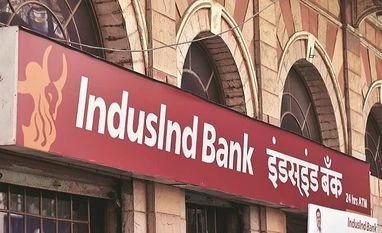The drop comes as analysts flagged deepening challenges to deposit growth, and potential margin compression in quarters ahead.
Nuvama Institutional Equities, for instance, has downgraded the stock to ‘hold’ from ‘buy’, and has cut its one-year target price to Rs 1,375 (from Rs 1,400) as it expects deposit competition to intensify in Q4, which may prove to be negative for mid-sized banks such as IndusInd.
"The management guided for 20 per cent year-on-year (YoY) asset and deposit growth each in FY24, higher than what peers are guiding. Deposit growth, however, is the real constraining factor. The sequential growth in operating expenditure (opex) for IndusInd has been lower than peers over the last three years, implying peers are investing more in branches and technology, which would eventually show up in balance sheet growth and customer acquisition," Mahrukh Adajania of Nuvama said in a co-authored report with Madhukar Ladha and Shrishti Jagati.
IndusInd Bank’s deposits rose 3 per cent quarter-on-quarter (QoQ)/14 per cent YoY, capped by a 3 per cent sequential decline in savings account (SA) deposits. This was after a dip of 6 per cent in Q2, despite the hike in savings rate. The management attributed the decline to customers moving to term deposits and their conscious strategy to give up some bulk SA.
However, current account (CA) deposits grew 13 per cent QoQ/50 per cent YoY driven by escrow in real estate, cash management for non-bank finance companies (NBFCs), PSU dividend mandates, and trading/forex.
"IIB managed to garner retail deposits in the form of CA and term deposits (TD) from select affluent and non-resident Indian (NRI) pockets. However, given its historically sub-par/non-sticky deposit profile, IIB would continue to face challenges in a deposit-constrained environment, given the narrowing wedge with loan growth," concurred Krishnan ASV, Deepak Shinde, and Neelam Bhatia of HDFC Securities.
They have ‘reduce’ rating on the stock with a target of Rs 1,060 per share as they believe accelerated competitive intensity for deposits is likely to result in a growth-margin trade-off.
That apart, analysts believe the lender may see pressure on net interest income (NII) and net interest margins (NIMs) from here on, given the dominance of fixed-rate portfolio and focus on retail TD mobilisation.
With nearly 50 per cent of its advances being fixed-rate in nature, and its focus on accelerating deposits, rising interest rates may be less favourable in the quarter ahead, warned ICICI Securities.
The third overhang will be clarity on the extension of the managing director and chief executive officer (MD & CEO), Sumant Kathpalia’s, tenure.
Overall, IndusInd Bank reported a 58 per cent YoY jump in consolidated net profit to Rs 1,963.64 crore in October-December quarter on the back of strong growth in net interest income. A sharp decline in provisions for bad loans also boosted the bank’s bottomline.
Consolidated NII grew 18 per cent YoY to Rs 4,495 crore, and NIM was at 4.27 per cent. As on December 31, the bank’s total deposits were at Rs 3.3 trillion, while advances were Rs 2.7 trillion (up 19 per cent YoY).
IIB's asset quality was steady in Q3, driven by lower slippages. The management guided to end FY23 with a loan growth of 20 per cent. Healthy provisioning in the micro-finance portfolio and contingent provisioning buffer of 0.8 per cent of loans will enable a steep decline in credit cost, thus driving recovery in earnings, analysts said.
"We believe IndusInd is on track to deliver a return on asset (RoA)/return on equity (RoE) of 1.9 per cent/16.9 per cent in FY25. IIB trades at undemanding valuations of 1.3x FY25E book value per share (BVPS) and we expect the stock to re-rate upwards aided by steady delivery on growth and return metrics," said analysts at JM Financial.
To read the full story, Subscribe Now at just Rs 249 a month
Already a subscriber? Log in
Subscribe To BS Premium
₹249
Renews automatically
₹1699₹1999
Opt for auto renewal and save Rs. 300 Renews automatically
₹1999
What you get on BS Premium?
-
Unlock 30+ premium stories daily hand-picked by our editors, across devices on browser and app.
-
Pick your 5 favourite companies, get a daily email with all news updates on them.
Full access to our intuitive epaper - clip, save, share articles from any device; newspaper archives from 2006.
Preferential invites to Business Standard events.
Curated newsletters on markets, personal finance, policy & politics, start-ups, technology, and more.
Need More Information - write to us at assist@bsmail.in
)